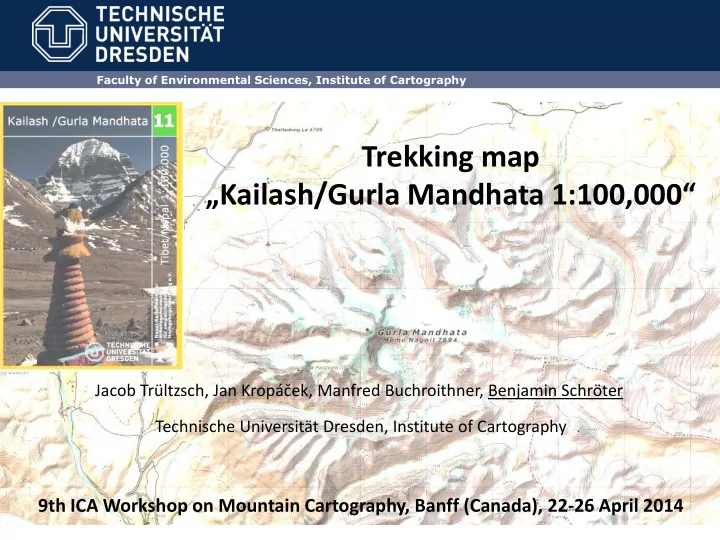

Faculty of Environmental Sciences, Institute of Cartography Trekking map „Kailash/Gurla Mandhata 1:100,000“ Jacob Trültzsch, Jan Kropáček, Manfred Buchroithner, Benjamin Schröter Technische Universität Dresden, Institute of Cartography 9th ICA Workshop on Mountain Cartography, Banff (Canada), 22-26 April 2014
Faculty of Environmental Sciences, Institute of Cartography Motivation 1. Several trekking maps of high mountain areas worldwide have been published at Institute of Cartography, TU Dresden 2. Complete Himalaya Map Series 3. Demand for an up-to-date map showing this benchmark area of TiP/WET 4. Product!!!
Faculty of Environmental Sciences, Institute of Cartography
Faculty of Environmental Sciences, Institute of Cartography Framework within research projects: TiP and WET
Faculty of Environmental Sciences, Institute of Cartography Some Information 1. Outstanding cultural and religious importance – pilgrimage (Kailash and Lake Manasarovar circuits) 2. Natural beauty – Climbing/trekking tourism (Gurla Mandhata, Limi Valley) 3. 4 big rivers of SE Asia originate here: N – Indus, E – Brahmaputra, S – Karnali, W – Sutlaj – religious importance and water sources
Faculty of Environmental Sciences, Institute of Cartography Data sources and collection/challenges 1. High resolution satellite imagery: Pleiades, DEM ASTER+SRTM 2. Digitization performed as social cartography project „Coffee Break Mapping“ – 16 quadrants with common mapping guidelines
Faculty of Environmental Sciences, Institute of Cartography Kloster K Punkt Durch Panoramio Bilder zu erkennen, Tibetisch Gompa Tschörten T Punkt Stupa; oft weiß gestrichen Gebetsfahnen GF Punkt Kann deutlich kleiner als dieses Beispiel sein Windschutz WS Punkt Diese Windschütze die als für Tiere UFO aussehen kommen ziemlich oft vor. Bestehen von steinernen Mauern und gut gedüngten Boden. Gletscher GL Polygon den Bergschrund muss man einfach abschätzen
Faculty of Environmental Sciences, Institute of Cartography Data sources and collection/challenges 1. High resolution satellite imagery: Pleiades, DEM ASTER+SRTM 2. Digitization performed as social cartography project „Coffee Break Mapping“ – 16 quadrants with common mapping guidelines 3. Ground data collected during 3 strenuous field trips 4. Local knowledge on toponymic data (hard to get, especially Tibet/China) 5. Significant differences between western/standard Tibetan language, various kinds of transcriptions 6. Tibetologists checked all names/spelling
Faculty of Environmental Sciences, Institute of Cartography
Faculty of Environmental Sciences, Institute of Cartography
Faculty of Environmental Sciences, Institute of Cartography
Faculty of Environmental Sciences, Institute of Cartography
Faculty of Environmental Sciences, Institute of Cartography
Faculty of Environmental Sciences, Institute of Cartography Thank you very much for your attention! !And finally the map! Further questions: skal.trylc@gmail.com
Recommend
More recommend